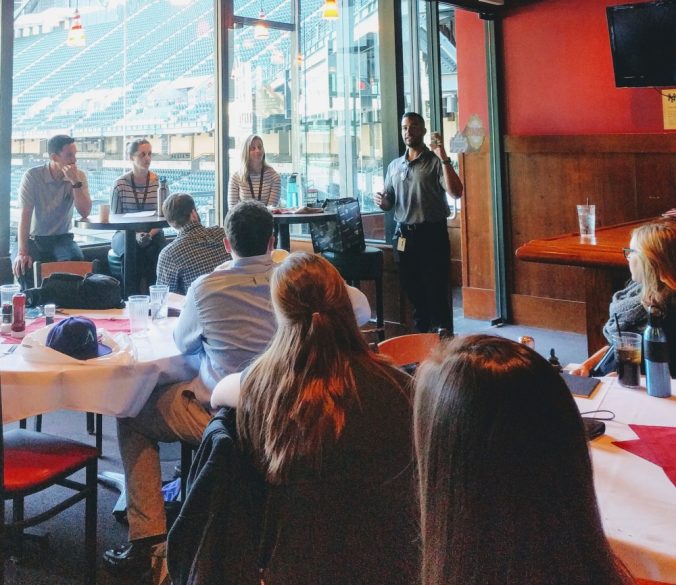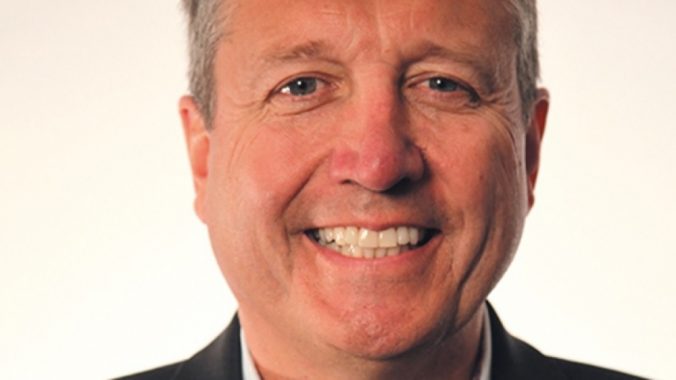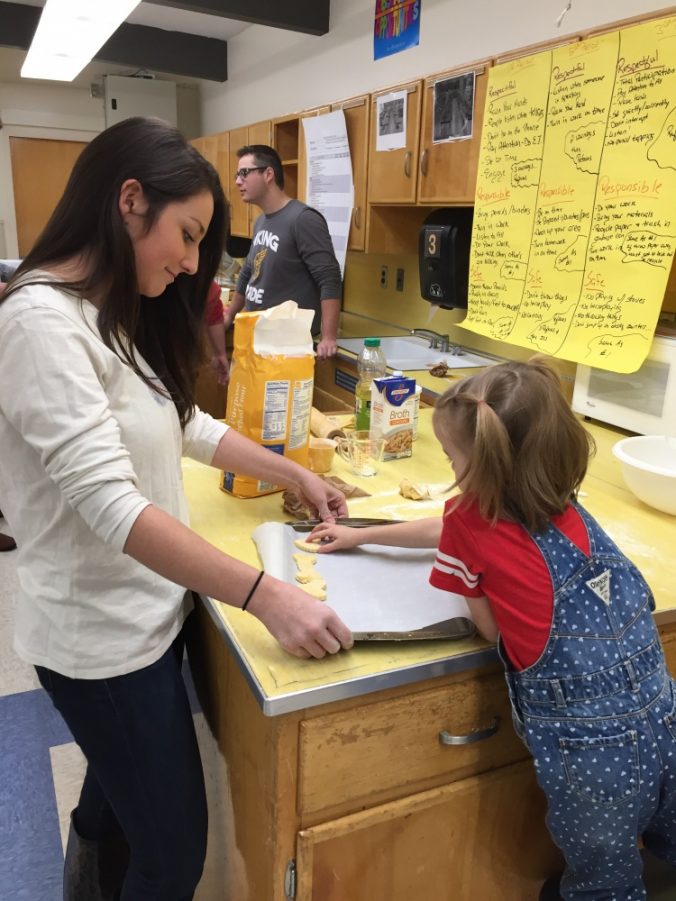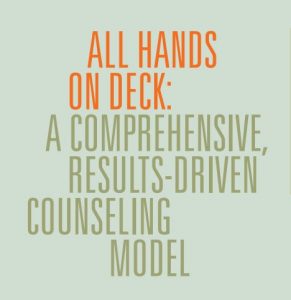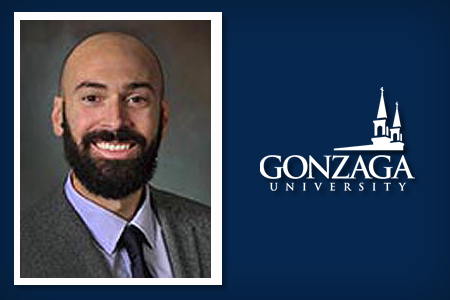- Tell us about yourself: My name is Brendan Sabean, class of 2014 and I earned my degree in Bachelors of Education.
- What are you doing now? I currently coach men’s basketball at Grand Canyon University and serve as the Special Assistant to the Head Coach. My role includes player development, preparation of practice and game plans, pre- and post-game video analysis and editing. As well as creating scouting reports of opponents.
- Why did you choose a program in the School of Education at Gonzaga? I originally started as a Business Major and knew in my sophomore year that it was not what I wanted to do. I knew I wanted to spend my life working in basketball and wanted to pursue coaching. I then change my major to physical education because I knew the lessons I learned would correlate directly coaching and teaching through sport.
- What influenced you the most during your time at Gonzaga? While I was at Gonzaga I had two major influences. The first was Dr. Jerry Krause, whom I met while working as a student manager for the men’s basketball team. Coach Krause was our director of operations and immediately he and I formed a strong bond. Each day at practice we would talk about everything, life, school, basketball. As a lifelong teacher himself, he always wanted me to become a teacher. He was my main influence for my switch from business to education. I can still remember the day I switched my major and told Coach Krause, he was so ecstatic and proud of me. I always looked to him as a mentor and grandfather like figure. Even today when we talk I always make sure to tell him I love him and thank him for being such a great influence on my life. The second influence was Dr. Rickel. When I wanted to switch my major I had no idea how to go about it. She took me under her wing and really allowed me to settle into my new major and new classes. She was by far the coolest teacher I had and was someone I consider a friend. Her kindness and open heart is what makes the school of education special.
- What was your greatest lesson learned at Gonzaga? The greatest lessons I learned at Gonzaga are to be yourself and to surround yourself with good, quality people. Gonzaga has such a strong sense of family and I believe that environment allowed me to be myself and grow into the person I am today.
- What is the most rewarding aspect of working in your field? Most challenging? The most rewarding aspect of coaching basketball at the college level is connecting to the players and seeing them grow not only as players, but also as people off the court. Being a part of a college student’s development as a person is a very rewarding feeling. In coaching you encounter people from all walks of life, from all over the world, and getting to create bonds with people who may be similar to you or nothing like you is special. The most challenging is earning the complete trust of a college student that you have nothing in common with and showing them that you care for them as not just a basketball player, but more so as a person.
- What critical issues do you see that need to be addressed in your field? College basketball is at a point where the integrity of the game is in question. We need to get back to our good morals and make this game about the student athlete’s growth as players and people, rather than worrying about the money and profits that can be made off of players, schools, etc.
- What advice do you have for future education professionals? I would say to go into your major with an open mind and willingness to learn from everyone you encounter. Take time to get to know those around you in all of your classes because you never know where that person may end up. Some day they may be in a position to help you out. Some day they may be reaching out to you for help. Gonzaga is a special place, full of special people. Embrace the fact you are part of something unique because I can guarantee you will make memories and learn lessons that will last a lifetime.
Category: Uncategorized (Page 3 of 4)
This is the first part in a three-part series. To read part II, click here. To read part III, click here.
A brief connection often goes a long way. The world of networking may seem like an overwhelming one, but it certainly helps connect oneself to a number of opportunities.
Here at Gonzaga University, Assistant Professor in the Department of Sport and Physical Education, Dr. Jimmy Smith, holds the world of networking in a high regard. He works to expose his students to a variety of networking opportunities. Through connections with a company called Tremont Global Education, Smith took a group of students to Phoenix, AZ, last spring, giving them the opportunity to interact with people from the Phoenix Suns (NBA), Phoenix Coyotes (NHL), and Arizona Diamondbacks (MLB), along with attending Major League Baseball Spring Training. Through further connection with Gonzaga baseball alumnus, Anthony Synegal, the group also met with the marketing executive for the Arizona Cardinals (NFL).
“We show up and we talk to executives and ask, how do I get these jobs? What do I need to do? Whose hands do I need to shake?” Smith said. “It makes a lot of sense for the students when they’re hearing it from different people.”
Fast forward to June 2017, Dr. Smith connected again with an individual from Tremont Global named Scott Gray. The two discussed the curriculum of the Sports and Fitness in the Digital Age class here at Gonzaga, and the focus on the use of technology in the sports industry. After further discussion, Gray mentioned his connections with the Kansas City Royals and the challenges they face.
The Royals (along with all Major League Baseball teams) have representation in the Dominican Republic. Gray connected Smith with them, specifically their liaison, Jeff Diskin, Director of Cultural Development for the Kansas City Royals, who is responsible for preparing prospects to make the jump to the Major League in the United States. These players often lack a basic understanding of cultural differences, and their success hinges on developing that basic understanding.
“They need help understanding something as simple as doing laundry, opening a checking account, leaving a tip at a restaurant, or even ordering at a restaurant,” Smith said.
After connecting with the Royals and examining the curriculum and projects of the Sports and Fitness in the Digital Age class, GU students decided to take on a semester long project in which they create video content for the Royals’ athletes who are transitioning from the Dominican Republic. The players can watch these videos to prepare for their transition to play in the United States.
The trip to Phoenix last spring worked as a networking springboard that eventually connected GU to this project. Networking plays a big role in discovering exclusive projects like this.
“When you’re a college student, you get into these bubbles. But I think one of the greatest opportunities is to get outside of that comfort level, because once you leave college, that’s exactly what you’re going to have to do,” Smith said.
This is why Dr. Smith strives to organize similar trips. These trips give students an opportunity to escape the bubble and connect with professionals in the industry. The goal is to not only help students learn how to talk to people, but understand how talking to people can lead them to different opportunities and future projects. The trips emphasize interaction with professionals to create the connections that eventually springboard into something bigger – the same way Smith’s connections with Tremont Global eventually connected him to the Royals.
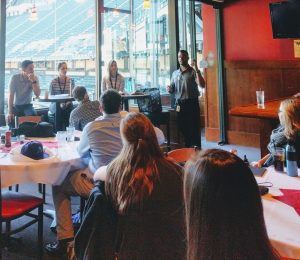
Athlete, firefighter, lawyer, leader.
These words describe Bill Smith of Calgary, Alberta. After a career in football with the Calgary Dinos team, for which he was a part during their Vanier Cup win in 1985, Smith decided to make a career change and become a firefighter.
Seeking leadership advancement in the job he loved, Smith approached his superiors only to find out that he needed higher qualifications.
Along with his wife Mary, Smith enrolled in Gonzaga’s Master’s in Leadership and Administration in the 1997-1999 Calgary cohort. Surprisingly, after earning his degree, he was told that he was now overqualified for a higher position.
Smith decided to resign and instead pursue a law degree. After graduating with a Bachelor of Laws from the University of Calgary in 2003 and articling at Parlee McLaw, he and Dave Findlay, his partner, took over the law practice of Bruce Miller.
In June of 2016, Smith opened his own boutique law firm, Law Shop – Legal Easy, that supports small and medium sized companies with affordable prices.
This year, Smith used his top-notch leadership skills to run for Mayor of the city of Calgary. Although he lost in the October 16 election, he proved to be a candidate strong in leadership and vison for his beloved city.
On November 4, 2017, the School of Education (SOE) held its first ever Day of Service. Over 30 SOE students, staff, faculty and alumni gathered on a chilly Saturday morning at Shaw Middle School. There, they joined forces with teachers and students from Shaw to complete several community services projects.
Volunteers walked across the street to Northeast Community Center (NECC), where together they painted an underutilized wall and transformed it into a massive chalkboard. The group toured NECC and learned about its vast range of community resources and current initiatives.
After the chalkboard painting project was completed, Day of Service participants returned to Shaw’s campus. They created school spirit signage to liven up the school’s gymnasium, and collaborated to bake hundreds of dog biscuits to be donated to the Spokane County Regional Animal Protection Service (SCRAPS).
The Day of Service concluded with volunteers sharing a meal together and building relationship between Gonzaga and local Spokane school community.
View some photos from our Day of Service below:
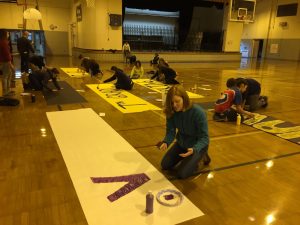
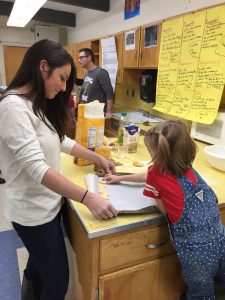
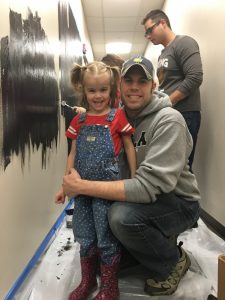
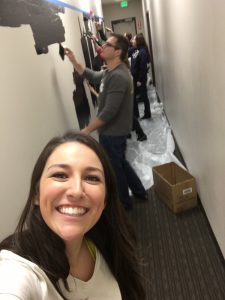
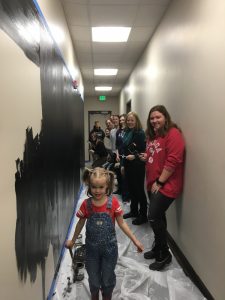
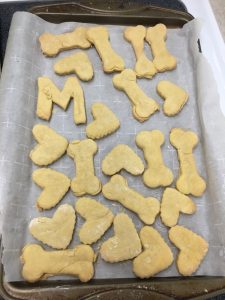
In the Department of Educational Leadership and Administration, the instructors travel to each cohort’s city to teach on site. In Williams Lake, British Columbia, the population is made up of 3 First Nations as well as the descendants of European settlers. Rhonda, and others in her cohort, helped the instructors learn and understand the dynamics of the area. From the first day of class, Rhonda advocated for and celebrated the many ways our cohort was diverse – professional role, gender, race, and age. She very graciously responded when others were less gracious and consistently showed the attitude of a learner. She was committed to learning from everyone and every situation. She was also able to raise the tough questions. Several of her instructors trusted her to facilitate discussion of these questions with the group. In these ways, she was exceptional.
But what really set Rhonda apart was her commitment to support everyone else. She was aware of every candidate’s needs in the group and wanted each person to succeed. Instructors were also on the receiving end of this support. In our program, each candidate completes a 5-chapter capstone which is analogous to a thesis. When I would call to check in on her progress in the capstone, she would ask how I was doing. So she showed care and commitment in supporting me!
Throughout her personal and professional life, she spends all of her time supporting individuals. But she also interacts with the larger system, seeking to improve them. In her Oral Exam, she told me, “I’m done waiting for someone else to do those things!” Congratulations to Rhonda!
-Dr. Elaine Radmer
- Tell us about yourself: My name is Ziyba Ibragimova. I received an M.Ed in Leadership & Administration in August of 2015
- What are you doing now?: I have started my own enterprise called One Small World Trainings. I offer workshops on cultural competence and cultural awareness for both mainstream Canadian groups or organizations and immigrant/refugee groups. I also offer mental health wellness workshops for immigrant/refugee groups.
- Why did you choose a program in the School of Education at Gonzaga? Gonzaga has a history in my area of offering reputable Masters level programs.
- What influenced you the most during your time at Gonzaga? My advisor and at times instructor, Dan Mahoney, was the greatest influence on me. His genuine caring for all of us, patience, understanding, and willingness to teach us how to do things right rather than just give a grade was truly admirable. He is an authentic leader who is not driven by his ego. I don’t believe anyone anywhere could have done a more complete or excellent job.
- What was your greatest lesson learned at Gonzaga? Through various presentations in most of our classes, I developed my creativity and confidence in going outside the norm. My goal was always to appeal to the audience. I wasn’t much aware of my own capacity for this until I did my Master’s. In general, my experience with Gonzaga helped me believe in myself and see the sky as the limit.
- What is the most rewarding aspect of working in your field? Most challenging? The most rewarding aspect is the hope that I may make a difference in bringing people together. Being invited into the lived reality of immigrants and refugees is a privilege that teaches me in many ways. The challenge is to stay open to seeing what is needed and what will work to bring about the well-being of others.
- What critical issues do you see that need to be addressed in your field? In terms of immigrants and refugees, very little is happening to integrate each into mainstream society both emotionally and in awareness. Similarly, nothing is being done to help mainstream society understand the newcomers. Hence, there are divisions and lack of trust that need not be there. Right now I am working with Syrian women, and being with them, understanding them, feeling accepted by them and seeing their challenges to integrate into Canadian society is fulfilling and enlightening. Expanding this work to other communities and to mainstream Canadians is not easy.
- What advice do you have for future education professionals? Go outside your comfort zone. Recognize that finding a new understanding of oneself is exciting and strengthening. Be creative in every venture.
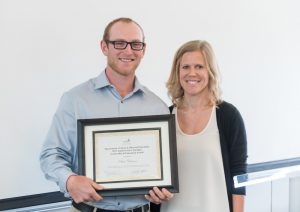
Sam Brown receives the Wardian Award from department chair, Kristen Kavon.
Congrats to Cory Notestine, Gonzaga School Counseling alumni, on his election to the NASCA Board of Directors! https://schoolcounselor.org/asca/media/asca/Press%20releases/PR_2016boardelection.pdf
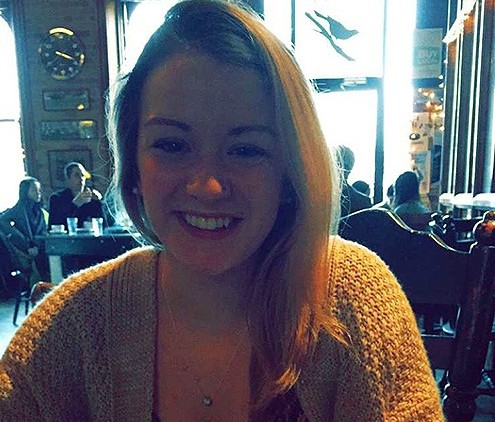
Brandy Rippon earns the William A. Garrigan, S.J., Award for the highest undergraduate cumulative GPA
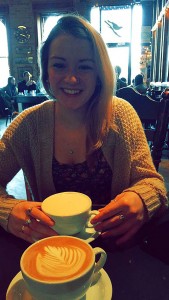
Brandy Rippon, an English major from Marcus, Washington, with minors in political science and women’s and gender studies, will receive the William A. Garrigan, S.J., Award as the undergraduate who has achieved the highest cumulative grade-point average.
Gonzaga’s undergraduate commencement ceremony begins at 9:30 a.m., Sunday, May 8 in the Spokane Arena. The ceremony is among Gonzaga’s three 123rd commencement exercises May 6-8.
Next year, she plans to pursue a master’s in teaching degree. Since coming to Gonzaga, Rippon has realized her passion for helping others. In addition to working at the Writing Center, Rippon has contributed her time at Second Harvest food bank, and has been involved in a number of mentoring programs through the Center for Community Action and Service-Learning.
Also, she served as an editor for The Fringe, Gonzaga’s gender and sexuality focused literary and art magazine.
“Gonzaga has helped me be more aware of social justice issues,” Rippon said. “I’ve met a lot of people here who are super passionate about so many things that it’s made me want to be more passionate about things in my life.”
She hopes to become a teacher who has a positive influence on her students.
